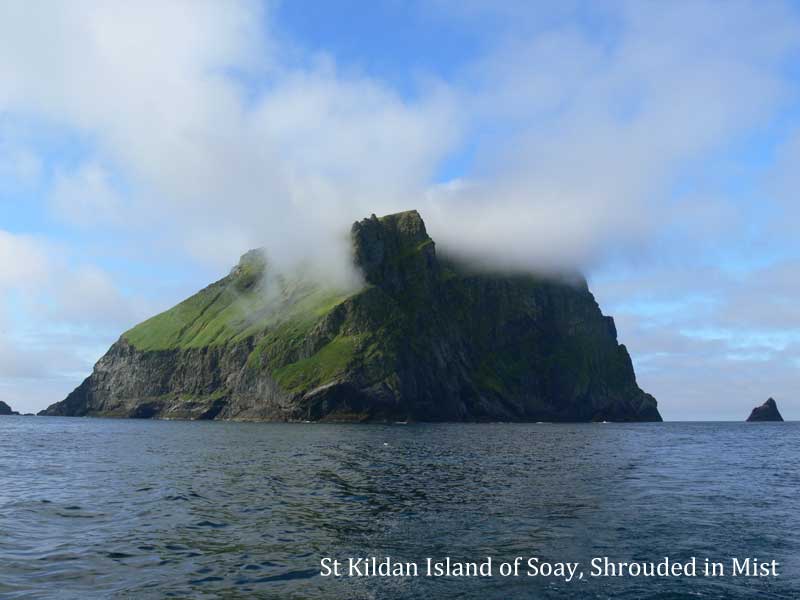Dropped Down From the Clouds
The Friday Reflection by James M. Kushiner
August 28, 2020

The Book of Acts is the opening chapter in the spreading of the Gospel to the "uttermost ends of the earth." Some of those living at the ends of the earth became Christians many generations later.
Most likely it was Irish monks who reached the far fringe of Europe known as St. Kilda or Hirta. In 1549 Donald Monroe in his Description of the Occidental i.e. Western Isles of Scotland, wrote of Hirta:
"The inhabitants thairof are simple creatures, scant learnit in ony Religion: but Mccloyd of Haray his Stewart, or quhom he deputtus in sic office, sayles anes in the midsymmer, with sum chaplain to baptize bairns thair, and gif they want ane chaiplane, thai baptize thair bairns thameselfis." [184]
Clergy likely visited this outpost of the Hebrides but once a year. In 1698 Martin Martin published A Late Voyage to St Kilda, noting that St. Kildans were "of the reformed religion." Since he visited the island for a time he could add detail:
"They leave off working after twelve of the clock on Saturday, as being an ancient custom delivered down to them from their ancestors, and go no more to it till Monday morning. They believe in God the Father, the Son, and Holy Ghost; and a state of future happiness and misery, and that all events, whether good or bad, are determined by God. They use a set form of prayer at the hoisting of their sails: they lie down, rise, and begin their labours in the name of God..."
"The inhabitants come to the churchyard every Sunday morning, the chapel not being capacious enough to receive them; here they devoutly say the Lord's prayer, Creed, and Ten Commandments."
"They observe the festivals of Christmas, Easter, Good Friday, St Columba's Day, and that of All Saints." (Late Voyage, 286-7)
Sometime in the past a crucifix had been brought to Hirta, which they depended on:
"They marry early and publicly, all natives of both sexes being present. The officer who performs the marriage tenders a crucifix to the married couple, who lay their right hands on it, and then the marriage is ratified." (Description, 188)
"They swear decisive oaths by the crucifix, and this puts an end to any controversy... They never swear or steal, neither do they take God's name in vain at any time; they are free from whoredom and adultery, and of those other immoralities that abound so much everywhere else." (189)
"They are altogether ignorant of the vices of foreigners, and governed by the dictates of reason and Christianity, as it was first delivered to them by those heroic souls whose zeal moved them to undergo danger and trouble to plant religion here in one of the remotest corners of the world." (Martin, Late Voyage, 304)
One St Kildan, visiting the Isle of Harris but stranded there because of a storm, "was prevailed upon by some of them that traded to Glasgow to go thither with them."
"Upon his arrival in Glasgow, he was like one that had been dropped from the clouds into a new world, whose language, habit, etc., were in all respects new to him; he never imagined that such big houses of stone were made with hands; and for the pavements of the streets, he thought it must needs be altogether natural, for he could not believe that men would be at the pains to beat stones into the ground to walk upon..." (Description, 192)
When taken inside Glasgow Cathedral, "he was yet more surprised, and held up his hands in admiration, wondering how it was possible for men to build such a prodigious fabric, which he supposed to be the largest in the universe." (193)
How would our visitor, wonderstruck by the alien world of 17th-century Glasgow, react to our cities in 2020? Yes, it's easy to romanticize the past, but Martin's summary makes me ponder modern "progress":
"There is this only wanting to make them the happiest people in the habitable globe, viz., that they themselves do not know how happy they are, and how much they are above the avarice and slavery of the rest of mankind. Their way of living makes them condemn gold and silver, as below the dignity of human nature; they live by the munificence of Heaven; and have no design upon one another, but such as are purely suggested by justice and benevolence." (Late Voyage, 304)
Justice and benevolence are crucial to the life of any village, or metropolis. But whence the mercy and grace required to make such men? Luke knew and told the tale of the Crucified One, taken up in the clouds, and the story continues. Depend on it.
Yours for Christ, Creed & Culture,

James M. Kushiner
Executive Director, The Fellowship of St. James
—James M. Kushiner is Executive Editor of Touchstone: A Journal of Mere Christianity, and Executive Director of The Fellowship of St. James.







